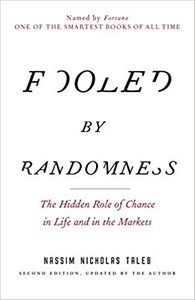"Fooled By Randomness" By Nassim Taleb | Reading Highlights #4

Current Book & Quotes From: "Fooled By Randomness" by Nassim Taleb

Signaling and Communication:
“One cab driver in Chicago explained to me that he could tell if traders he picked up near the Chicago Board of Trade, a futures exchange, were doing well. “They get all puffed up,” he said. I found it interesting (and mysterious) that he could detect it so rapidly. I later got some plausible explanation from evolutionary psychology, which claims that such physical manifestations of one’s performance in life, just like an animal’s dominant condition, can be used for signaling: It makes the winners seem easily visible, which is efficient in mate selection.”- Nassim Taleb
I’ve always found this idea of signaling to be interesting. Most people are focused on how they speak and articulate their ideas. Yes, it’s very important to be able to articulate your ideas clearly and thoroughly, but consider the idea that the majority of our communication is done non-verbally.
The majority of our communication is given via posture, physical movements, facial expressions and even more subtle cues such as gestures, glances, heart rate, etc. All of this stuff is highly fascinating in a world of more interconnectedness than ever before.
Over the internet, we lose out on a lot of these cues. This loss causes a variety of issues in human communication and is, in my opinion, the reason for 99% of trolling around the internet. If you imagine 2 people in a Twitter argument having that argument face to face, you could easily imagine the conversation going a lot differently or perhaps, not happening at all.
Alternative Histories
“I start with the platitude that one cannot judge a performance in any given field (war, politics, medicine, investments) by the results, but by the costs of the alternative (i.e., if history played out in a different way). Such substitute courses of events are called alternative histories. Clearly, the quality of a decision cannot be solely judged based on its outcome, but such a point seems to be voiced only by people who fail (those who succeed attribute their success to the quality of their decision). Such opinion—“that I followed the best course”—is what politicians on their way out of office keep telling those members of the press who still listen to them—eliciting the customary commiserating “yes, we know” that makes the sting even worse. And like many platitudes, this one, while being too obvious, is not easy to carry out in practice.”- Nassim Taleb
Alternative histories is yet another fascinating idea that Nassim presents. This is something that we tend not to give much thought.
Our brains are not wired to give much energy and attention to things that could have happened but didn’t. Rather, we tend to focus on the most vivid, “relevant” and emotionally stimulating events.
This idea of alternative histories is highly relevant to investing in my own life. When I’m investing, I’m always considering alternative options. Countless spreadsheets upon spreadsheets will aid me in trying to determine which strategy I should employ for each dollar I invest into something.
When you consider the probabilistic outcomes of many of the investments that one could make at any given moment, you realize that the options are numerous. There are so many different routes you can take with any given capital that you have at any given time. The quality of your decisions cannot solely be based on the outcome, but also must consider what would have happened had you invested in the alternative routes.
Russian Roulette and Alternative Histories
“One can illustrate the strange concept of alternative histories as follows. Imagine an eccentric (and bored) tycoon offering you $10 million to play Russian roulette, i.e., to put a revolver containing one bullet in the six available chambers to your head and pull the trigger. Each realization would count as one history, for a total of six possible histories of equal probabilities. Five out of these six histories would lead to enrichment; one would lead to a statistic, that is, an obituary with an embarrassing (but certainly original) cause of death. The problem is that only one of the histories is observed in reality; and the winner of $10 million would elicit the admiration and praise of some fatuous journalist (the very same ones who unconditionally admire the Forbes 500 billionaires)”- Nassim Taleb
The game of Russian Roulette is often used in so many examples all over the world. It’s such a fascinating and simple game yet it stems outwards into so many complex details and explanations and behaviors when one sits down to really analyze it.
If someone offered you $10m to play Russian roulette, would you do it? You would have to consider the possible outcomes. You have a 1/6 chance of death and a 5/6 chance of enrichment.
The odds seem to be ever in your favor, right? Might be a good bet to take, some might speculate. The issue though is that the 1/6 chance that you die is a game-ender. As in, you won’t be able to play any game tomorrow.
For someone like me, I would rather not play the game. Even for $1b. To me, the alternative histories are clear. If I don’t play the game, I can simply go on living my life and play alternative games that allow me to make much less money but which also allow me to continue to play the game tomorrow even if I lose today.
And this brings us around full circle to one of Taleb’s greatest ideas that I enjoy thinking about: play the game in such a way that you can never go fully bust.
Whether you’re investing, playing a sport, lifting weights or what have you, you want to play the game today in such a manner that you cannot screw up so badly that you cannot return and play again tomorrow. If you always play in this way, then you can always show up tomorrow and have another shot at turning the tables in your favor.
“the public observes the external signs of wealth without even having a glimpse at the source (we call such source the generator).Consider the possibility that the Russian roulette winner would be used as a role model by his family, friends, and neighbors.”- Nassim Taleb
This has rather funny implications in life. We see this everywhere we look: public sentiment is “dumb”… It doesn’t reflect rational thinking and rational behavior. Say that you play the game of Russian roulette and are lucky enough to walk away with $10m, the public will now look to you as having played the game and won. A true role model for people to follow in your footsteps.
They become overly concerned with the outcome - getting rich - and far too inoculated to the generator - you had to risk your life at a probability of 20% chance of death in order to win the $10m.
“The reader can see my unusual notion of alternative accounting: $10 million earned through Russian roulette does not have the same value as $10 million earned through the diligent and artful practice of dentistry. They are the same, can buy the same goods, except that one’s dependence on randomness is greater than the other. To an accountant, though, they would be identical; to your next-door neighbor too. Yet, deep down, I cannot help but consider them as qualitatively different”- Nassim Taleb
Dependence on randomness is something that we see all over the place, once you open your eyes to it. So many “successful” people who claim to have all the secrets of success are no more than lucky fools of randomness. They “succeeded” due to events that aligned in a way that allowed them the fortune of achieving whatever they’ve achieved.
The game of probabilities always plays out. These same people often end up losing everything that they think they achieved because they fail to learn the role of randomness in their own life.
Good post my friend. I have not read this one but have it on the shelf, along with the Black Swan
Thanks! It’s a great book, I’ve only read Skin in the Game by Taleb before, but I think it’s recommended to start with Fooled By Randomness rather than do what I did.
Posted using Partiko iOS
Interesting blog @khaleelkazi. My answer to Mr. Nassim Taleb and to @khallelkazi as well - I don't want to get "Fooled by Randomness." Instead i would like to work hard consistently for the rest of my life.
Thank you so much for participating the Partiko Delegation Plan Round 1! We really appreciate your support! As part of the delegation benefits, we just gave you a 3.00% upvote! Together, let’s change the world!
To listen to the audio version of this article click on the play image.

Brought to you by @tts. If you find it useful please consider upvoting this reply.
Hi, @khaleelkazi!
You just got a 19.33% upvote from SteemPlus!
To get higher upvotes, earn more SteemPlus Points (SPP). On your Steemit wallet, check your SPP balance and click on "How to earn SPP?" to find out all the ways to earn.
If you're not using SteemPlus yet, please check our last posts in here to see the many ways in which SteemPlus can improve your Steem experience on Steemit and Busy.
Interesting post... I'm going to buy the book soon. You are right, signalling gets lost on the internet. We've been reduced to adding emojis to the end of the post to show our intent
Posted using Partiko Android
I would rather work consistently for 10 years because it will be difficult to loose the money, but if i loose the money, I will be able to build again